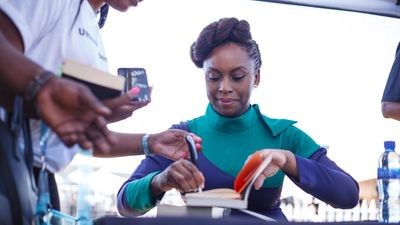A Controversy Followed Chimamanda Ngozi Adichie to Abantu Book Fest—How Did it Turn Out?
Attendees of the book festival had mixed reactions to her interview with Prof. Pumla Gqola.
All eyes are on Chimamanda Ngozi Adichie. Those without seats in the noisy tent are seated at her feet. Everyone is listening intently. Cameras go off trying to catch her at her every angle. Our beloved Prof. Pumla Gqola, asks Adichie what exactly she intended with her comments on trans-women. Adichie responds: "When the trans noise began."
Some in the audience shake their heads in what may be disappointment, a few nod and the rest appear to be enraptured by Adichie. But no-one seems visibly distressed by her comments. No-one gets up and leaves. After Adichie is finished speaking, the hall erupts into applause.
Last week, the beloved annual Abantu Book Festival took place in Soweto, Johannesburg. This year's marquee guest was acclaimed Nigerian author Chimamanda Ngozi Adichie. She was received by a somewhat divided community due to her controversial comments last year about trans-folk during an interview with Britain's Channel 4 News last year.
The Abantu Book Festival is an annual event that celebrates the culture of reading and writing in a safe and inclusive space for black people. In its third year now, it has come to be one of the most highly anticipated literary events on the calendars of black South Africans and black folk in general.
Being this safe space, why did the organisers of the festival then invite Adichie given her past comments, comments she then rehashed?
Unsurprisingly, many who came to see Adichie speak were either unphased by the writer's reputation or defended her point.
Johannesburg writer Nobantu Shabangu, who identifies as non-binary and trans, expressed indifference to Adichie's presence at the festival citing that "womanhood and manhood are tenuous issues.''
Another attendee, Boitshepo Mvulane, was in vehement support of Adichie, her main argument being that "we need to have a better manner of debating so that there is enlightenment for both parties". She added that "many of us are ignorant about LGBT issues and it comes out in our nakedness at the dinner table".
Another attendee, Sixo Geilishe, asserted that "as a human rights activist, Adichie was simply a victim of the trap that one is intentionally being exclusive" and that "it was never her intention to do so."
Continuing her response, Adichie felt that she was in the beginning, on the defensive because she had been misunderstood. She asserted that she was on the side of trans-women and not against them, even going as far as saying that trans-women actually made the best case for feminism. In addition, she said that she refused to conform to the use of certain language which she claimed was an orthodoxy with which she was not going to align herself.
Listen to her full response below.
Twitter user @divanificent expressed how Adichie was not a victim of the culture of 'cancelling' she spoke of and how her transphobic views were dangerous given her standing and various platforms.
A troubling aspect of the controversy is how Abantu has not directly responded to any of the concerns of both attendees and those who did not attend. They could not be reached for comment at the time of publication. Several prominent South African writers who attended Abantu, feminists in their own right, have not publicly condemned Adichie's comments. Perhaps the excitement of bagging an internationally revered author prevents people from being willing to rock the boat? Abantu has established itself as a community that seeks to hold others accountable and yet, it has a hard time doing the same.
Another twitter user @leighratoh spoke to how she felt that it was uncanny how many had attended Abantu solely to see Adichie and then proceeded to tweet their fake outrage about her comments, triggering trans-women who didn't even attend the event in the first place.
Following Adichie's infamous interview with Channel 4 News, Editor of Out Magazine Raquel Willis, a transgender woman herself, articulated quite well: "Chimamanda being asked about trans women is like Lena Dunham being asked about Black women. It doesn't work. We can speak for ourselves."
- Blackbird Books Publishes 'Exhale: Queer African Erotic Fiction' Anthology - OkayAfrica ›
- Chimamanda Ngozi Adichie's Biafra Novel Snags 'Winner of Winners' Award - OkayAfrica ›
- 5 South African Photo Books to Check Out - OkayAfrica ›
- Chimamanda Ngozi Adichie Pens Open Letter to President Biden - OkayAfrica ›
- Abantu Book Festival Announces This Year's Speakers - OkayAfrica ›
- Chimamanda Ngozi Adichie Has A Novel Coming in 2025! - Okayplayer ›
